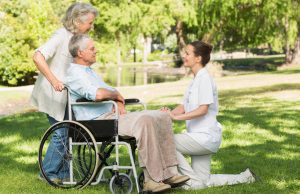 Obstructive sleep apnea (OSA) is common after a spinal injury. The study suggests that patients who experienced a spinal injury could benefit from a sleep assessment test to diagnose sleep apnea.
Obstructive sleep apnea (OSA) is common after a spinal injury. The study suggests that patients who experienced a spinal injury could benefit from a sleep assessment test to diagnose sleep apnea.
The results of the study showed that 77 percent of spinal cord injury patients have symptomatic sleep-disordered breathing and 92 percent have poor sleep quality. More specifically, there are high rates of obstructive sleep apnea among those with sleep-disordered breathing.
Advertisement
Dr. Abdulghani Sankari, lead author, said, “The majority of spinal cord injury survivors have symptomatic sleep-disordered breathing and poor sleep that may be missed if not carefully assessed. Our findings help in identifying the mechanism of sleep-disordered breathing in spinal cord injury and may provide potential targets for new treatment.”
“Sleep-disordered breathing may contribute to increased cardiovascular mortality in spinal cord injury patients. All spinal cord injury patients should undergo a comprehensive sleep evaluation using full, overnight polysomnography for the accurate diagnosis of sleep apnea,” added Dr. M. Safwan Badr who was also involved in the study.
The researchers studied 26 chronic spinal cord injury patients who all underwent baseline spirometry, filled out a number of questionnaires, and attended polysomnography with flow and pharyngeal pressure measurements.
This is the first study of its kind to compare spinal injuries with sleep-disordered breathing. The Centers for Disease Control and Prevention (CDC) reports that nearly 200,000 Americans are living with a spinal injury, so many of them may also be living with an undiagnosed sleep disorder.
Connection between sleep apnea and spinal cord injury
Sleep apnea is a disorder in which the individual’s breathing pauses numerous times throughout the night. This can result in high blood pressure and for women, neurological problems. Sleep apnea often goes undiagnosed in spinal injuries, so it’s important to recognize the signs and symptoms to prompt your doctor to run a sleep test.
Signs that you may have sleep apnea include sleepiness during the day along with difficulty sleeping at night, loud snoring, waking up with a dry mouth, sore throat, or headache, and problems with attention and concentration.
If you encounter any of these signs and symptoms after you have experienced a spinal injury, speak to your doctor as there are simple solutions for treating sleep apnea such as a CPAP device, a mask worn nightly that creates a steady flow of air to prevent pauses in breathing.
Related Reading:
Untreated sleep apnea linked to aggressive melanoma
Severe, untreated sleep apnea has been linked to aggressive melanoma. Study author Dr. Miguel Angel Martinez-Garcia said, “This is the first large, prospective multicenter study that was specifically constructed to look at the relationship between sleep apnea and a specific cancer.” Continue reading…
Advertisement
Obstructive sleep apnea may increase heart failure and death in women
Obstructive sleep apnea may increase heart failure and mortality in women. Risk factors for both sleep apnea and heart failure do differ between men and women, and it has been unclear whether the effects of sleep apnea on cardiovascular health were the same for both sexes. To establish any differences, researchers evaluated the links among sleep apnea, cardiac bio-markers that provide early evidence of heart disease, and occurrence of adverse heart outcomes in 1,625 individuals who were free of heart disease when first studied and followed for an average of almost 14 years. Continue reading…
Sources:
http://www.aasmnet.org/articles.aspx?id=4479
http://www.phxinjurylaw.com/the-connection-between-spinal-cord-injuries-and-sleep-apnea/
